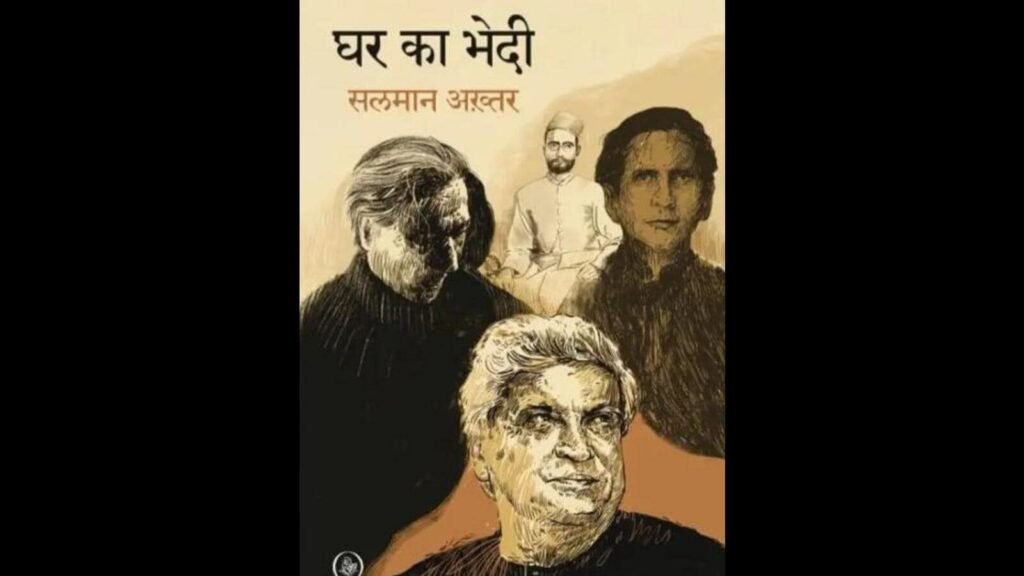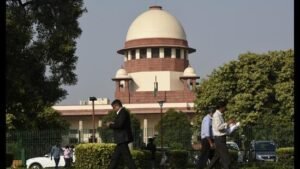
In hand is a mint-fresh book picturing eminent poets of the Urdu language who made up an amazing family with talent abundant. Lo! The author too is a poet who finds much in common with the genre of poetry and psychoanalysis. His brilliant interviews and talks online have taken the two disciplines to every Indian home with remarkable ease and wit. His is a strong connection with the city as he is an alumni of the Post Graduate Institute of Medical Sciences (PGI) here.

Intriguing indeed, is the title of the book, that opens one side in the Devanagari script and the other in the Nastaliq, in a fine design by Rajkamal publishers. The title too is equally alluring ‘Ghar ka Bhedi’: Salman Akhtar. Now what beans is this learned one is going to spill. The cover makes one more curious as it features portraits of his father, and well-known poet and lyricist Jan Nisar Akhtar, his grandfather Muztar Khairabaadi, his legendary uncle Majaz Lakhnavi and as media reports go, his famous estranged brother Javed Akhtar. The fact that the two have not spoken to each other was literally shouted out from the very popular television channel, none other than Lallantop and became the national news headline. The problem is which of these famous four to start with and what does the author, privy to the home secrets, ‘Ya Khuda’ (O’ Lord) going to say? Calmed by the writer’s introduction that the title has been taken from a line of his literary mother Safia Akhtar and that he is only doing literary criticism of the poetry of his dear ones. It is inevitable to begin with Majaz. This is because God may or may not love those who die young but we humans certainly do.
O my heart, what should I do?
The above line of the famous poem which wonders, ‘what is one to do with a sorrowing heart’, by Majaz, with romance as well as revolution at heart, was made famous in the voice of the Lucknow singer Talat Mahmood in the 1953 film ‘Thokaar’. And it still has the power to give collective goose pimples some seventy-one years later.
To recall the legend and tragedy of ‘Jaggan Bhaiya’, as his mother and aunt called him, he turns to a memoir of that name written by his scholarly aunt Hamida Salim and then goes on to delve deep into the tragic death of his uncle on a cold winter night of December: On the rooftop of a deserted tavern, shivering in a thin chikan kurta. The death of a poet, the death of Majaz. The show was over and the curtain was pulled down. But why? The why of it comes to him in lines of Majaz’s own poetry: ‘Zindagi saaz de rahi hai mujhe, Sehar-o-Aijaz de rahi hai mujhe, Aur bahut door asmano se, Maut awaz de rahi hai mujhe, (Life is gifting me music, blessing us with the calm of dawn and evening, and far away from the skies, death is calling out to me).
Of father, grandfather & big brother
Interestingly when he turns to patriarchy and tries to assess his father, the famed poet Jan Nisar Akhtar, he finds that there are six people in the room. His father is a respectable and well-known poet, a colorful Hindustani personality and a reluctant and incomplete father. The remaining three come from the writer’s own persona: A scholar of Urdu poetry, an American psychologist and a loving son.
When he turns to the poetry of his father he is pleasantly surprised to find him amazingly competent across genres from ghazal to nazam and in the lyrics of his film songs there is a beautiful array of words, reaching out straight to the heart with lyrics as diverse as ‘Main tumhi se poochti hoon mujhe tum se pyar kyun hai’ (I ask you that why I love you), Yeh dil aur unki nigahon ke saaye’ (My heart and the shadows of his love) and ‘Ai dil-e- nadan arzoo kya hai’ (O’ my naive heart what do you yearn for). The tribute to his grandfather comes with a regret that he reached the poetry of Muztar Khairabadi rather late. Yet, he picks up few of his gems to share with the readers and then one is pleasantly surprised to come across an often heard and beautiful couplet without knowing who had written it: ‘Waqt mujh par do kathin guzare hain, ik tere aane se pehle , ik tere jaane ke baad) (Only two phases were difficult for me, one before you came and one after you left).
And now coming to the Akhar brothers, the silence that reigns between them is broken in a full article in appreciation of his versatility, myriad talents, his success and the merit of his poetry which Salman does in great sincerity picking out five gems from Javed’s poetry. . Who says the two are not communicating? There are many ways of talking. This lovely and unusual book is dedicated to the fond memory of their mother who passed away young, Safia Akhtar (1915-1953).







